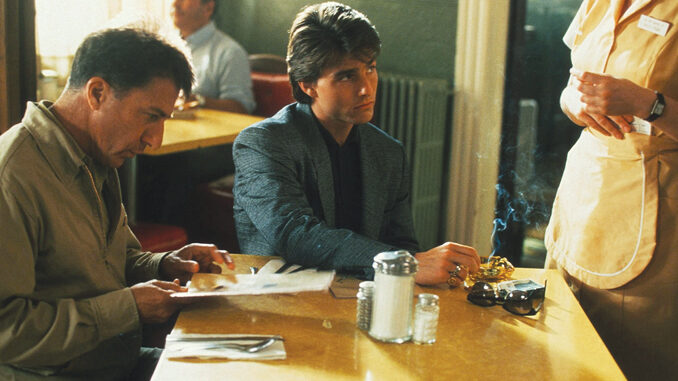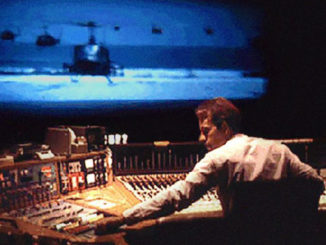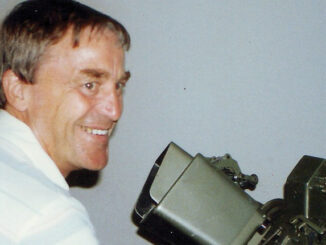
by Mary Woods
Starring Dustin Hoffman and Tom Cruise, Rain Man opened 21 years ago this December. It made a lot of money and won a lot of awards, including the Academy Award for Best Picture. Dustin Hoffman also won Best Actor for his role as Raymond Babbitt, the autistic savant. Accolades and box office success notwithstanding, Rain Man is one of those movies that has seeped into my consciousness and sits in the back of my brain.
Rain Man was the first time I had seen a character with autism on film. I’d never seen one in person, either. In 1988, autism wasn’t on the cover of magazines or part of a national debate about the safety of vaccines. I didn’t know any families who struggled with it. Raymond’s quirks and rituals were foreign to me, and fascinating. I recall that zing of amazement when he counted the toothpicks on the café floor. Little did I know how intimately immersed I would become with the confounding mystery of autism, and how Charlie Babbitt’s journey would reflect my own.
This is initially a movie about limitations. Raymond’s limitations are obvious. His dis- order is evident in every ritual, every movement, every stilted interaction. His limitations land him in a mental institution at an early age and will keep him there. Even though typical film narratives are built on an arc of transformation, Raymond is doggedly consistent from the first frame to the last. The arc of change in this story belongs to Charlie, Tom Cruise’s character. Charlie’s limitations are just as crippling as his disabled brother’s. Charlie has a limited ability to love the people in his life, or to feel empathy. He is a miserable, driven workaholic whose business is imploding. His wealthy father dies, but leaves him nothing; Charlie’s anger and hurt simmer just below the surface. Charlie has no qualms about taking his newly discovered brother out of the mental institution and exploiting him for the money that he thinks he deserves, but that Raymond will never need or appreciate.
Charlie meets an immovable object in Raymond. The arrogant Trump-wannabe has to learn to listen and pay attention to the needs of others, no matter how irrational. He can’t fight Raymond’s intractable demand to watch People’s Court at 3:00 p.m. or have the maple syrup on the table before the pancakes arrive. Nor can he cure it. He just has to accept it. So ultimately, the movie is about acceptance. There are some things over which we are powerless––as Charlie learns––so we can just relax. The anger, frustration and that “less than” feeling diminish as Charlie lets Raymond just be…Raymond. I know the feeling.
Of course, I’ve buried the lead. In 2000, my third child, my beautiful two-year-old son Woody, was diagnosed with autism. Woody is not as high-functioning as Raymond; his speech is almost entirely echolalic, meaning that he repeats words and phrases he has heard elsewhere. The puzzle of Woody’s mind is even more labyrinthine because I have to piece together his ritualistic needs from observation and trial-and-error, not verbal cues. They have points of comparison, however. Raymond recited lines from Abbott & Costello’s “Who’s on First “ routine ad nauseum; Woody utters snippets from Ice Age. For Raymond, the repetition of his “Script” was a calming strategy. Woody has typed for us that he says things over and over to “practice talking.” Woody has no savant skills, like Raymond’s math wizardry, but he can use assistive technology to communicate by typing and is able to function at grade level in school. Raymond never had the advantage of an education, and was probably considered retarded. I now know that persons with autism have average or above-average intelligence, and I will never underestimate Woody’s cognitive abilities. His communication glitches and odd behaviors don’t mean there’s nothing going on upstairs.
When my husband and I first received Woody’s diagnosis, we were devastated. We sat down to watch Rain Man again, in a misguided effort to find out more about what we were dealing with. I soon started sobbing and couldn’t get through it. I wasn’t watching the story of two unlikely brothers, or the transformation of an arrogant, angry young man. All I saw was an actor pretending to have the devastating physical qualities I had tried to deny seeing in my little boy. I saw that society considered the institutionalization of a person with autism as a logical, even inevitable, outcome. All I saw was a bleak and hopeless future; I wasn’t seeing the movie at all.
Now I find that I have gone on a kind of wacky road trip with autism, just like Charlie Babbitt did. It’s often frustrating, annoying and difficult, but I’ve reached the level of acceptance that allows me to enjoy the ride. I love my boy for exactly who he is, with no limitations. Definitely.





